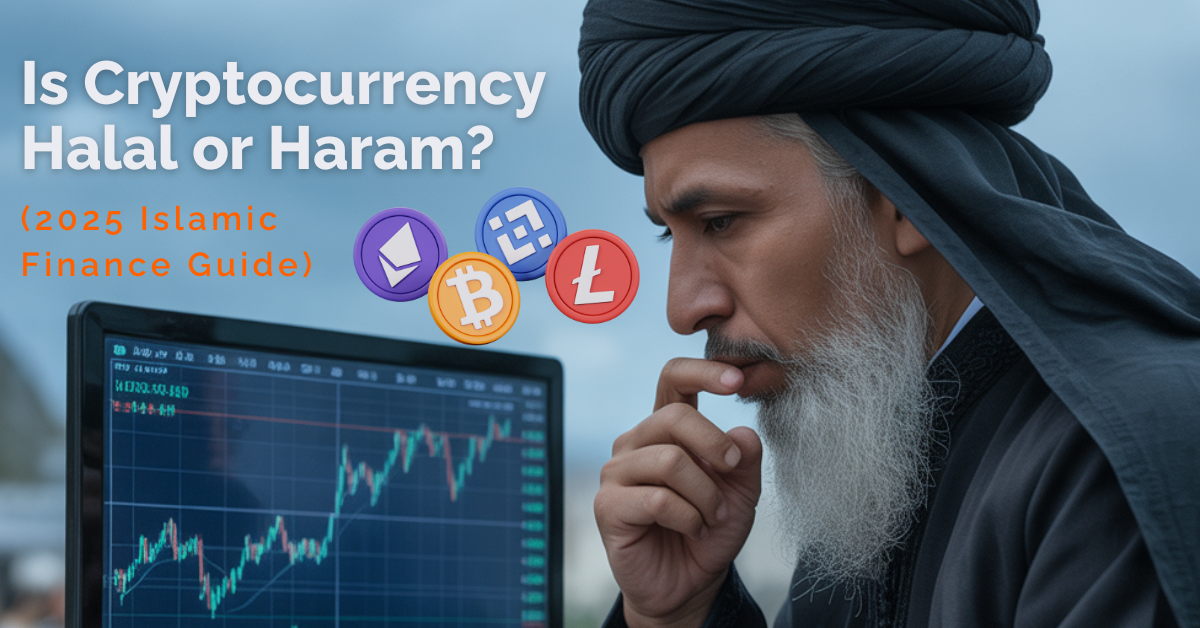Cryptocurrency has grown from a small innovation into a worldwide financial trend. Many Muslims ask whether it is halal or haram. Islamic finance experts now study blockchain to see if cryptocurrency activities fit Shariah principles. In this 2025 Islamic Finance Guide by Fillyx, we break down the Islamic perspective on cryptocurrency and guide you to make informed decisions when trading in the digital era.
Understanding Cryptocurrency in Simple Terms
A clear understanding of cryptocurrency and its principles is necessary before deciding if it’s halal or haram.
Cryptocurrency is a digital currency that operates independently of any central bank. Bitcoin, Ethereum, and Binance Coin run on blockchain, which keeps every transaction secure, transparent, and trustworthy.
Crypto can be used for:
-
Online transactions
-
Investments and trading
-
Storing value
-
Smart contracts and decentralized applications (dApps)
The Core Question: Is Cryptocurrency Halal or Haram?
Shariah law judges every activity in Islam as halal or haram based on core principles like justice, transparency, and the prohibition of riba, gharar, and maysir.
Let’s examine cryptocurrency through these lenses:
1. The Issue of Riba (Interest)
Just keeping your crypto won’t make it grow. However, when used in lending platforms or staking systems that provide guaranteed returns, this can fall under riba — making it potentially haram.
Halal aspect: Holding crypto as an asset or for trading without interest is generally permissible.
2. The Element of Gharar (Uncertainty)
Islam does not permit financial dealings with unclear conditions. Some argue that the high volatility of crypto markets constitutes gharar. However, others counter that uncertainty exists in all markets — and if transactions are transparent and the asset is identifiable, it is not excessive gharar.
3. The Concern of Maysir (Gambling)
If cryptocurrency trading turns into speculation or betting on price movements without real analysis or purpose, it can be considered maysir, which is haram. But responsible, informed investment — much like stock trading — can be seen as halal.
Scholars’ Opinions on Cryptocurrency
Islamic scholars have different opinions regarding cryptocurrency. Here’s a summary of different viewpoints:
🔹 Scholars Who Consider Cryptocurrency Halal
Many modern scholars and Islamic finance experts consider cryptocurrency halal when users:
-
Use it for legitimate, ethical purposes.
-
Buy and sell it transparently and in accordance with the law.
-
It avoids any interest-based transactions.
-
Users employ it as a medium of exchange or a store of value.
For example, Mufti Faraz Adam is a prominent Islamic finance scholar who states that cryptocurrency can qualify as halal if it functions as money and maintains full transparency.
🔹 Scholars Who Consider Cryptocurrency Haram
On the other hand, some scholars consider cryptocurrency haram because:
-
It lacks intrinsic value or government backing.
-
It is highly volatile, making it speculative.
-
Criminals can use it for money laundering and other illegal activities.
Institutions such as Darul Uloom Deoband (India) and some Middle Eastern scholars have raised concerns about cryptocurrency for these reasons
🔹 Neutral View
Some Islamic finance councils remain neutral, urging ongoing study as the technology advances and regulations develop.
Islamic Finance and Digital Assets in 2025
By 2025, Islamic finance and cryptocurrency have matured. Muslim-majority populations, including the UAE, Saudi Arabia, and Malaysia, are actively developing Shariah-compliant crypto regulations.
For example:
-
Dubai is rising as a leading crypto hub, driving ethical finance initiatives.
-
Malaysia enforces digital asset guidelines based on Islamic principles.
-
Indonesia’s MUI debates blockchain use while highlighting its potential for halal businesses.
Islamic finance embraces the potential of crypto while actively building a halal framework for digital assets.
Halal Ways to Engage with Cryptocurrency
If you want to engage in the crypto space while following Islamic values, follow these guidelines:
1. Choose Halal Coins and Projects
Don’t invest in coins tied to gambling, alcohol, or interest-based services. Focus on projects that foster transparency, ethical growth, and financial inclusion.
2. Avoid Interest-Based Earnings
Do not engage in crypto staking or lending platforms that promise fixed interest returns.
3. Focus on Real Use Cases
Choose projects that create real-world benefits, including decentralized apps, payment systems, and environmentally conscious blockchain efforts.
4. Conduct Thorough Research
Before investing, analyze a coin’s purpose, whitepaper, and compliance with Islamic ethics.
5. Seek Guidance from Scholars
Speak with Islamic finance experts or Shariah advisors specializing in digital assets.
Pros and Cons of Cryptocurrency from an Islamic Perspective
| Halal/Positive Aspects | Haram/Risky Aspects |
|---|---|
| Transparency through blockchain | High volatility and speculation |
| No interest involved inherently | Risk of gambling-like behavior |
| Promotes financial independence | Lack of intrinsic value debate |
| Global accessibility and inclusion | Use in illegal transactions |
Crypto Adoption Among Muslims in 2025
Crypto is attracting more Muslim investors every day. Fillyx offers transparent, ethical, and Shariah-compliant trading solutions that help users invest responsibly.
In 2025, over 200 million Muslims worldwide are actively exploring crypto for investments and remittances. The growing demand for halal-certified crypto assets is shaping the industry’s future.
Conclusion about Is Cryptocurrency Halal or Haram
Scholars continue to debate whether cryptocurrency is halal or haram, but Islam clearly values fairness, transparency, and ethical conduct in finance. When investors use cryptocurrency responsibly and openly, it can follow these principles.
In 2025, as technology advances and regulations strengthen, Muslim investors can engage in the digital economy without violating their faith. They must trade ethically, avoid interest, and select legitimate projects.
Ready to explore cryptocurrency the halal and transparent way?
Read more at Fillyx — where innovation meets integrity.
✅ Trade with confidence
✅ Zero hidden charges
✅ 100% transparency in transactions
👉 Visit www.fillyx.com and start your ethical crypto trading journey today!
FAQs – Is Cryptocurrency Halal or Haram?
1. Is Bitcoin halal or haram in Islam?
Many scholars consider Bitcoin halal when people use it ethically and for lawful transactions, but they regard speculative trading or earning interest as haram.
2. Can Muslims invest in crypto in 2025?
Muslims can invest in crypto by steering clear of riba, avoiding excessive speculation, and choosing ethical projects.
3. What makes crypto haram?
Islamic law forbids crypto when people use it for gambling, earn interest, or engage in illegal activities.
4. Are there halal cryptocurrencies?
Yes. Some coins and projects promote transparency, fairness, and ethical finance, making them suitable for halal investment.
5. Is trading crypto like gambling?
Trading turns into gambling (maysir) only when people rely purely on speculation without any analysis or knowledge.
Author
-
I am Hamza Qureshi. I am passionate about Digital Marketing with expertise in SEO, content strategy, social media growth, and performance marketing. With a strong focus on helping businesses build their online presence, Hamza has worked across diverse industries to create impactful campaigns that drive real results.






